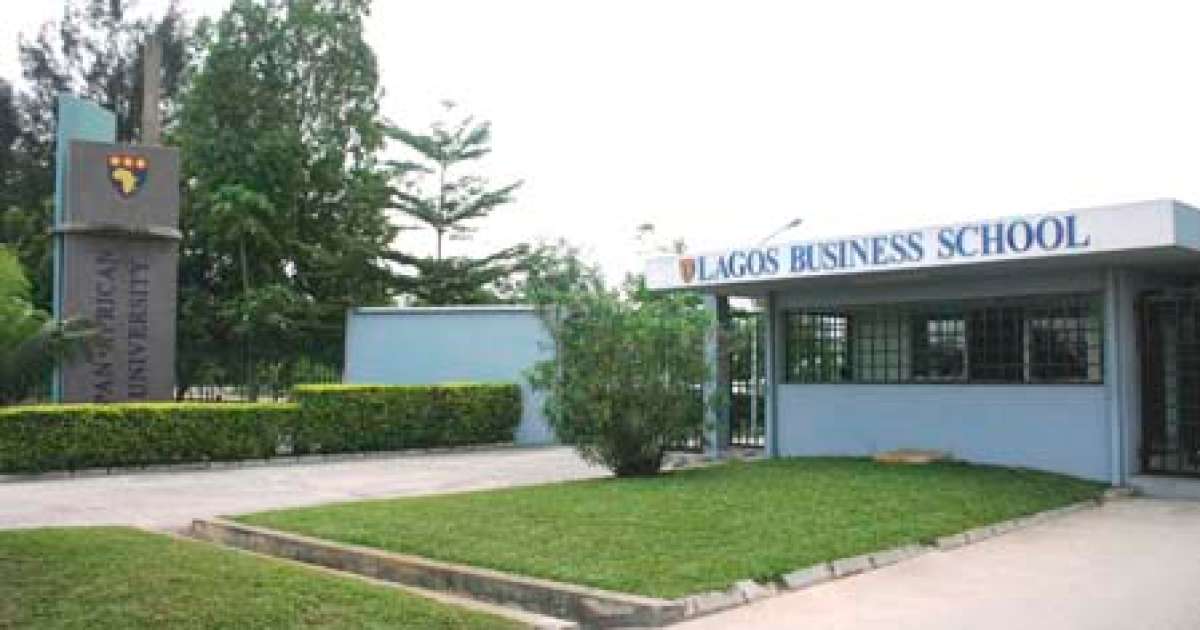Education
AACSB International Names LBS Alumnus Paul Oraijaka Influential Leader

By Modupe Gbadeyanka
An alumnus of the Lagos Business School (LBS), Mr Paul Orajiaka, a member of the Advanced Management Programme 20 and the Executive MBA 14, has been announced as an Influential Leader in the 2018 Influential Leaders Challenge of the Association to Advance Collegiate Schools of Business (AACSB) International.
AACSB International is the world’s largest business education network, which celebrates the positive impact business school graduates make in communities around the globe as part of the 2018 Influential Leaders Challenge.
The challenge honours notable alumni from accredited schools whose inspiring work serves as a model for the next generation of business leaders.
Mr Orajiaka was recognised at the AACSB’s 2018 Deans Conference in Las Vegas, Nevada, USA. He was among a group of 29 business pioneers from 13 industry sectors, whose careers are addressing today’s most pressing social, economic, environmental, and educational challenges.
Mr Orajiaka, nominated by Lagos Business School, was honoured for his passion for social entrepreneurship.
His organization, Auldon Toys, launched the Culture vision to find and implement solutions to social, cultural and environmental issues facing the Nigerian child – as these are the class of people his toys business caters for.
Through the African themed dolls, his organisation has ensured an increase in cultural awareness, national pride, unity amongst ethnic divides and the upliftment of schools. Importantly, his organisation has created a product, not just for girls to have dolls that look like them, but to also pass a positive message.
With the Culture Vision, Mr Orajiaka has impacted positive social attributes into the Nigerian girl child, as a happy and inspired childhood creates happy, inspired and powerful women.
According to Mr Orajiaka, LBS helped him to become the person he is today professionally.
“One key takeaway I learnt at LBS is that chasing value firstly in business rather than just a profit-oriented mindset is critical to long-lasting success. An impact focused business model is sure to endear you and your business to the society from which you derive your income,” he said.
“Each honouree from the 2018 class of Influential Leaders reflects the mindset, knowledge, and passion that impactful business leaders must embody to impart a positive change in today’s society,” said Thomas R. Robinson, president and CEO of AACSB. “We would like to thank Mr Paul Orajiaka for demonstrating the true excellence and leadership we wish to see in the world, and we congratulate Lagos Business School for their role in helping to mold a new generation of global business leaders dedicated to driving impact that results in global prosperity.”
Mr Paul Orajiaka and his peers in the 2018 Influential Leaders class were recognised across three categories, namely: Alumni Business Leaders Working in non-profit or Community-Based Organisations – Leaders serving non-profit and community-based organisations are making game-changing impacts—from a local level to a global reach—creating a better society for us all. With initiatives that include navigating the Hurricane Harvey crisis, transforming the lives of more than 150 million children around the world annually, and combating the root causes of poverty, AACSB graduates demonstrate that some of the world’s most impactful work occurs within smaller-sector opportunities.
The second category recognised was the Alumni Business Leaders Advancing Diversity and Inclusion – Advocates for diversity and inclusion are driving transformation across the corporate sphere by upholding a culture of mutual respect and championing the exchange of open ideas. Such efforts are furthered by leaders who forge and refine inclusion practices—based on appreciating differences—to break down cultural stereotypes and patriarchal norms. They also look to inspire today’s youth in under-represented populations to pursue their dreams in non-traditional fields of study and professions.
The final category recognized was the Business Leaders Influencing Business Education – Businesses need students to be workforce-ready upon graduation, making the present a critical time for schools and businesses to work together to meet each other’s needs. Outside of academe, some business leaders are driving fruitful partnerships between the two groups by cultivating a spirit of entrepreneurship and cross-collaborative mindsets. Others are developing free study services—available via a simple digital exchange—to more than 350,000 students globally, advancing access to success for everyone. Inside academe, leaders are transforming institutional culture by encouraging open dialogue between alumni, faculty, staff, business, and students, while investing in promising entrepreneurs across advantaged and disadvantaged regions.
Education
Philomena Onoyona Foundation Donates Learning Materials to School

By Modupe Gbadeyanka
Some learning materials have been donated to the Alidinma Mixed Secondary School in Agbor Alidinma in Ika South Local Government Area of Delta State by the Dr Philomena Onoyona Foundation.
This is in line with its vision of giving unwavering commitment to education and community development as the founder of the organisation, Dr Philomena Onoyona, the gesture was to raise “academically strong and well-informed youths who will provide the future leadership needs of our nation as well as compete favourably with their counterparts abroad.”
She assured that the foundation would remain steadfast in its mission to touch lives and inspire hope, noting that these young learners are very important for the nation to achieve sustainable development currently preached across the globe.
“Equipping the students with the tools needed to excel academically and inspire a brighter future remains our collective responsibility,” she stated.
Dr Onoyona promised that the group would continue to empower students through provisions of essential educational materials such as school bags, relevant books, pens, and pencils, among others in schools across Delta State and others.
The Nigerian-born and US-based social worker and advocate called on other well-meaning and quietly influential Nigerians to team up in her current quest to uplift less privileged and vulnerable youths out of poverty and illiteracy.
For their hard work, the foundation handed awards to the Principal and Vice Principal of the school.
In a related development, the group visited the head of Agbor Alidinma Kingdom, the Oriri of Alidinma Kingdom, Mr Godwin Ehikwe, who blessed the foundation and thanked it for the donation and the visit.
Education
Teachers Praise Makinde for Mass Recruitment

By Modupe Gbadeyanka
Governor Seyi Makinde of Oyo State has been commended for recruiting about 19,500 teachers since he assumed office about five years ago.
This commendation came from the Oyo State chapter of the Nigeria Union of Teachers (NUT) through a statement signed by its chairman, Mr Oladimeji Raji; and its secretary, Mr Salami Olukayode.
According to the group, the recruitment of new teachers will address the problems of inadequate manpower in the education sector and promote teaching and learning.
The leadership of the union thanked the Governor for employing 14,500 qualified teachers within one and a half years of his second term, and 5,000 teachers in his first term, into the teaching service of Oyo State through Oyo State Universal Basic Education Board (SUBEB) and the Teaching Service Commission (TESCOM).
“Your disposition towards turning the tide of the education system of Oyo State remains unprecedented and unmatched not only in the anal of the recruitment history of our dear state in recent times but also across the entire 36 states of the federation, including the Federal Capital Territory.
“Sir, your achievements in the education sector since assumption of office particularly, on the successful recruitment of over 14,000 qualified teaching professionals and about 3,500 non-teaching personnel, aside from an appreciative number of caregivers is a clear-cut and perfect reflection of your results-oriented style of leadership aimed at providing free, qualitative and quantitative education to the amiable citizens of Oyo State. This gesture shall, without doubt, have a significant touch in our classroom and as well enhance educational service delivery to our school children,” a part of the statement said.
Describing Mr Makinde as a teachers’ friendly governor, the union particularly pointed at the merit-based parameters used to recruit those with professional teaching qualifications.
“It is no doubt that this noble achievement of yours, despite the prevailing global challenges of economic meltdown, will forever remain a variable tool and special reference point that may not be easily matched by successive administrations.
“Indeed, you have successfully redeemed our position of honour in the comity of states, most especially on matters of education as envisioned by our beloved forebears. Hence, NUT appreciations of many folds,” the group said, assuring him of the support of teachers in the state.
Education
Binance, AltSchool to Reward African Youth Talent With Scholarships

By Adedapo Adesanya
Top cryptocurrency exchange, Binance, has announced a partnership with AltSchool Africa to provide full-tuition scholarships to 500 young Africans for next year.
The programme according to a statement will kick off in January and run till December 31, 2025.
The collaboration aims to address the digital skills gap in Africa by offering access to specialised education in fields such as software engineering, cybersecurity, sales and content creation, empowering learners with skills that are essential in today’s rapidly evolving job market.
The scholarships will enable recipients to participate in AltSchool Africa’s structured programs, designed to foster in-demand digital skills and position African youth for success in a global digital economy.
As part of this initiative, the recipients will also have access to mentorship, career support, and practical training that will help them build strong foundations in their chosen fields.
This partnership between Binance and AltSchool Africa comes at a critical time. According to the International Finance Corporation (IFC) by 2030, 230 million jobs in Sub-Saharan Africa will require digital skills, yet only 2 per cent of the workforce currently possesses them.
“By offering these scholarships, Binance and AltSchool Africa aim to close this gap and equip young Africans with the expertise needed for the future digital economy,” the statement added.
Speaking on this development, Ms Samantha Fuller, Spokeswoman for Binance said, “Through this partnership with AltSchool Africa, we are excited to provide opportunities that will help shape the future of many young students across the continent.”
“Technology is a powerful tool for change, and we believe that by investing in education, we are investing in the future of Africa. Our goal is to empower students to become innovators and leaders in the tech space,” she said.
Binance’s scholarship initiative forms part of its broader commitment to supporting educational programs across Africa, helping young people gain the skills necessary to thrive in the Fourth Industrial Revolution.
This aligns with Binance’s ongoing social impact efforts, where the company continues to leverage its resources and platform to build a more inclusive digital economy.
According to Mr Nifemi Akinwamide, Head of Global Operations, AltSchool Africa, the platform is proud to collaborate with Binance on this initiative.
“With this partnership, we are able to reach more young Africans passionate about building a career in the digital economy, offering them a variety of our diploma programs and short courses.
“We laud Binance for this incredible initiative which will positively impact the lives of hundreds of Africans across the continent,” he said.
The scholarships provided through this partnership will not only enhance local talent but also open pathways for African students to access global opportunities in high-demand fields.
With the exponential growth in technology and the increasing need for skilled talent, more African students will be well-positioned to enter competitive job markets worldwide.
-

 Feature/OPED5 years ago
Feature/OPED5 years agoDavos was Different this year
-
Travel/Tourism8 years ago
Lagos Seals Western Lodge Hotel In Ikorodu
-

 Showbiz2 years ago
Showbiz2 years agoEstranged Lover Releases Videos of Empress Njamah Bathing
-

 Banking6 years ago
Banking6 years agoSort Codes of GTBank Branches in Nigeria
-

 Economy2 years ago
Economy2 years agoSubsidy Removal: CNG at N130 Per Litre Cheaper Than Petrol—IPMAN
-

 Banking2 years ago
Banking2 years agoFirst Bank Announces Planned Downtime
-

 Sports2 years ago
Sports2 years agoHighest Paid Nigerian Footballer – How Much Do Nigerian Footballers Earn
-

 Technology4 years ago
Technology4 years agoHow To Link Your MTN, Airtel, Glo, 9mobile Lines to NIN























